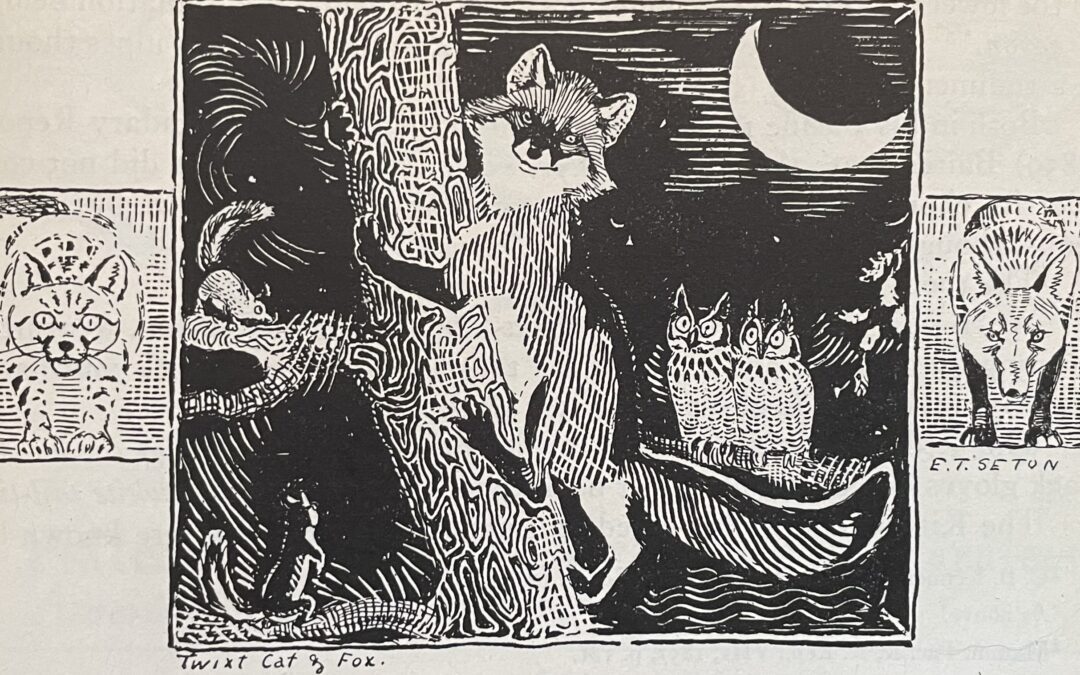Twixt Cat & Fox by Ernest Thompson Seton
This is one in an ongoing series of nature essays from Lives of Game Animals (1925-1928) written by Ernest Thompson Seton. At the end he describes the study of natural history “as a mosaic that is the dream of every wise one, more beautiful and amazing than any of our fanciful dreams of it can be, for it will be the truth.”
The Gray-Fox
Disposition/Vol I pg. 577-578
“If we mix equal parts of Red-fox, Coon, and Bobcat, and season the combination with a strong dash of Cottontail Rabbit, we shall have the Gray-fox’s disposition synthetically produced. He is shy, he is cunning, he is a desperate fighter when at bay, he loves the trees and yet rejoices in the briar brush, he can run for hours and is an adept at trick-trailing, but will hide in a burrow or up a tree; and the places he frequents are the places where any one of these animals also may be found.
As I read the classic pages of Audubon and Bachman, I note that they say the Gray-fox is ‘shy and cowardly.’ Reference to a long list of natural histories reveals the fact that every animal treated in this book is by someone described as “shy and cowardly.” The truth is, I take it, that no animal is such. All animals are brave, for I do not know of one – with the possible exception of the Opossum – that will not fight to the death when brought to bay, no matter how numerous or powerful his foes may be. What is there of cowardice in a helpless Gray-fox of ten pounds weight running away from 20 large hounds each 60 pounds, backed by half-a-dozen hunters each 150 pounds weight, on half-a-dozen horses each 1,500 pounds weight, and armed too often with guns and pistols into the bargain? Discretion is the better part of valour; the valiant Gray-fox is discreet. But do you want to see a fair fight and make a just appraisal of courage? Select a 10-pound Dog and match him against a 10-pound Fox. Then you will have no cause to charge the Fox with cowardice. Indeed you will have to play special Providence if you would save your Dog from destruction. Yes, go a step farther. You – a 150 pound man, we will suppose – go into the arena alone and armed only with nature’s weapons, and grapple with a 10-pound Gray-fox – if you dare; and see which of you will come out free of the taint of cowardice.
Men there be, indeed, who lie down and give up when certain death is closing in on them. But the Gray-fox, according to the hunter, J. C. Bruce, when caught in a trap, never is cowed, never gives up, in spite of his helplessness, “but will growl, snap, and bark from the time he sees you till he is dispatched.” A brave man loves a brave foe, they say. Our reaction to the dauntless fortitude of the brave Gray-fox then sheds a shameful light, a dastard colour on our own kind, if we believe the evidence given in the last chapter of this record.”
A History of Man as Seen by the Animals
“Someday I shall write a history of man as seen by the animals. They may justly say: “He is the most stupid and cowardly of all creatures. Although equipped with powers that are overwhelming, and with every advantage of size and assistance, he never is known to accept an equal fight, and at the slightest suggestion of danger, will fly back screaming with terror to hide in his den. Indeed, it is an axiom among us animals that the smallest of us need not fear the biggest of them, unless he be backed and protected by huge Dogs – renegades from our side – and has us hopelessly overmatched and outnumbered.
The Gray-fox is less swift, less strong, and less cunning than his cousin, the Red-fox. The one is a bandit, the other a burglar. But both know that they play a desperate game. They carry their lives in their teeth, and neither give nor expect quarter when the final show-down comes.
Every scrap of evidence goes to show that, whatever we think of the Gray-fox as an economic problem, as a menace to our material agricultural interests, he is at least endowed with the attributes that an impartial judge would say ‘make a hero.’”
Marriage Customs/Vol I pg. 578-579
“And what is the home-life of our hero? We should like to find it ideal, and, even if it were utterly regrettable, we should have to make excuses and allowances, as we do for weak-moralled humans. So far as known, the Gray-fox is a model husband and father; that is the tradition of his family; Wolves and Foxes are most exemplary. Alas, we have been so busy hounding the Gray-fox to his death, that we have never paused to ask what are his answers to the great questions of sex and duty that still torment ourselves….
Young naturalists of the new epoch, will you not keep these things in mind and look for them? The fact that this freebooter of the tall timber is a true and loving husband and father, with a home-life of social pleasures, and a song expression of his own; and every scrap of evidence that you can gather to prove these things is fine gold – is a new fragment of the priceless mosaic that every field-man is striving to piece together – a mosaic that is the dream of every wise one, more beautiful and amazing than any of our fanciful dreams of it can be, for it will be the truth.”

